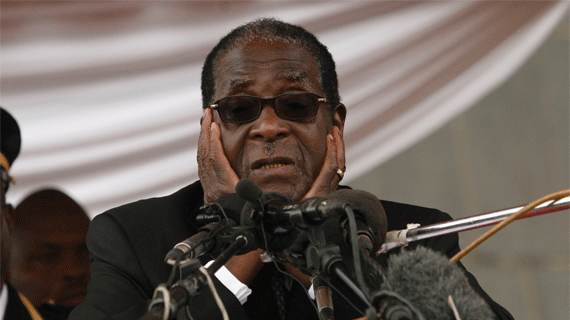
THE Zanu PF government yesterday said it will not lose sleep over the United States’ decision to exclude President Robert Mugabe at a summit for 47 African leaders to discuss trade later this year.
PHILLIP CHIDAVAENZI SENIOR REPORTER
President Barack Obama, it was reported yesterday, had decided not to extend invites to leaders of countries without good relations with the United States.
Those being excluded from the summit slated for August include Zimbabwe, Madagascar and Egypt.
But Media, Information and Broadcasting Services minister Professor Jonathan Moyo told local and regional military officers at the Zimbabwe Staff College in Harare that the countries that had been left out were well-endowed with natural resources such they did not need US help.
“People are saying Mugabe has been snubbed,” Moyo said. “It’s a non-issue.
“We can see that this is America pursuing its interests because it is afraid that China has made headway.
“Even this so-called summit is about trying to contain China. Countries that have relationships with China are not a part of it.”
- Chamisa under fire over US$120K donation
- Mavhunga puts DeMbare into Chibuku quarterfinals
- Pension funds bet on Cabora Bassa oilfields
- Councils defy govt fire tender directive
Keep Reading
Moyo said Zimbabwe was interested in forging ahead with its new economic discourse rather than “a trip to Washington”.
“These are old economics, old politics for us. We have at least a quarter of the world’s diamonds and that is more important than going to Washington,” he said.
“Americans have taught us not to value their meetings.”
The summit, which is scheduled for August 5 and 6, will seek to cement progress from the US president’s African safari last year.
It will focus on trade and investment in Africa while highlighting the US’s commitment to the continent’s security and democratic development.
Meanwhile, Moyo said “corrupt salaries” paid to heads of parastatals in the country needed to be dealt with if Zimbabwe’s new economic strategy is to succeed.
“We have false, corrupt salaries that pose a serious challenge in the public sector where some people are earning as much as $230 000 in monthly salaries,” he said.
“People in business don’t make that much profit in a month. I’ve also heard of people earning $27 000 in parastatals.
“These salaries can’t be appropriate for a new economy.”
Moyo’s remarks came in the wake of reports that Premier Service Medical Aid Society (PSMAS) top managers are gobbling at least $1,1 million in basic monthly salaries.
The State-owned society is reportedly reeling under a $38 million debt and is yet to be registered by the government to operate this year.
PSMAS chief executive officer Cuthbert Dube is reportedly earning $230 000 per month, all top managers getting a uniform $60 000, with the least paid middle managers earning between $15 000 and $30 000 per month.
Moyo last year suspended ZBC chief executive officer Happison Muchechetere to pave way for investigations after disclosures that he was earning over $40 000 in salary and allowances. ZBC employees had gone for over six months without pay.
The minister said such practices were an abuse of public funds and the government was committed to addressing such anomalies.
“We have got to deal with those issues. These salaries are coming from fees and subscriptions paid by the public,” he said.
“We are committed to dealing with those things. There is no reason why public officials should demand those things (perks).
“We have got to see the new thinking and the politics that inform the new economy, that is not being afraid of doing and saying the right things.”
He said the time for “politics of slogans” had disappeared with the old economy and what the country needed now was “informed debate”.
Moyo said the multicurrency regime had presented serious challenges in that it was making it difficult for the forging of the new economy as it had created serious distortions.
“Even a newspaper here costs $1. There is nothing of value that you can get for less than $1 and that means within this system we need a strategic review,” he said.
“There is the problem of false pricing. We still have the psychology of a pricing model based on the Zimbabwe dollar during the hyperinflationary era.
“We don’t need price controls, but a strategy to control false pricing.”










